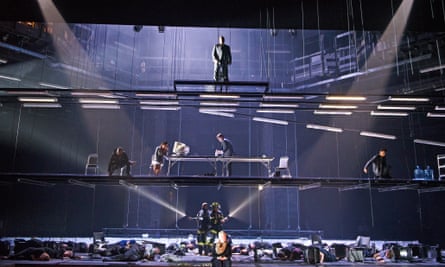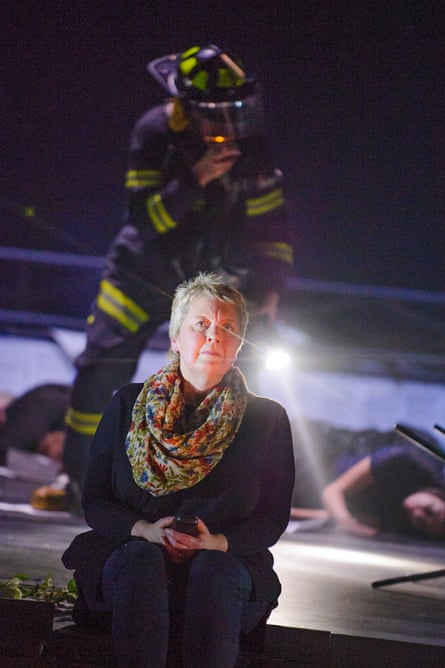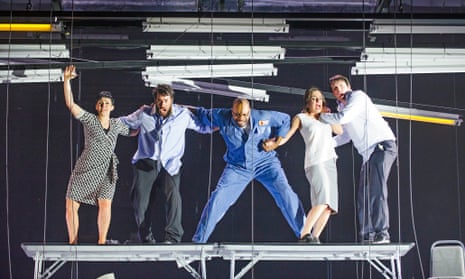The advance publicity for Tansy Davies’s opera, the latest to be commissioned by English National Opera, focussed on its subject matter, and whether it was appropriate to base a piece on the events of 9/11. What was never mentioned was whether what Davies and her librettist Nick Drake have created with director Deborah Warner is really an opera at all.
Certainly Between Worlds has all the paraphernalia of an opera. What appears on stage in the Barbican theatre (this year’s venue for ENO’s now annual excursion to a smaller, more flexible space) is an elaborate set on three levels designed by Michael Levine, a sizeable orchestra in the pit conducted by Gerry Cornelius, 14 solo singing roles and a chorus. And yet there are very few moments in the 85-minute work when it feels as if Davies’s score is driving the action, or that what the audience is seeing and hearing is a piece in which music has a shaping role in the drama.
That is certainly at least in part, a consequence of the subject matter. Fixing on what happened in the Twin Towers on that morning in September 2001 and on a small piece of such a cataclysmic event – the fate of five disparate individuals trapped together on one of the upper floors, immediately confines what Davies and Drake can possibly do. The parameters of the drama are fixed, its end tragically inevitable. There can be no narrative, no character development, in fact no drama, and in the end surprisingly little that is specific to 9/11.

Drake’s text effectively underlines those limitations by identifying the protagonists only by type - a younger gay woman (sung by Rhian Lois), a single mother and realtor (Clare Presland), a younger man scared of heights (William Morgan), an older man who is an adulterous husband (Philip Rhodes), and a janitor (Eric Greene). At the beginning all are seen leaving their homes and loved ones for work (or in the janitor’s case coming to the end of his shift) and saying their goodbyes, whether tender, fraught, fussy or angry; that is all the back-story we get, while the impact of what is happening is conveyed through the chorus on the ground below, who include onlookers, firefighters and, later, the mourners.
There are a few glosses. Time sometimes concertinas, sometimes dilates, and perched above the action is another character, a shaman, sung by countertenor Andrew Watts, whose role is sketchily defined, though according to the synopsis, at the end of the opera he becomes the janitor’s “spirit guide”. But the interactions between the victims and their attempts to communicate with the outside world are surprisingly measured and restrained. There’s no real sense from what’s portrayed on stage of the sheer chaotic terror of those moments, or that this is all about what Drake calls the “most important event of our time”.

Davies’s score, though expertly sung and played, adds less to the package than it might, too. Her vocal lines are economical, with passages of arioso rather than any fully fledged arias – no character gets the chance to reveal themselves musically, and though the printed score shows that the orchestral writing is busily detailed, relatively little of that seems to emerge from the pit. The best moments are the simplest – unaccompanied vocal lines and passages of hushed choral writing – when the orchestra falls away. But those occur towards the end, in the last quarter hour, when the work becomes a requiem, an act of remembrance, led off by the wordless laments of Susan Bickley as the mother of the younger man. Though probably the only way in which an opera on this subject could end, it is nothing like as affecting as it ought to be, and never reveals why Davies and Drake thought this a potent operatic subject in the first place.
Until 25 April. Box office: 020-7638 8891

Comments (…)
Sign in or create your Guardian account to join the discussion